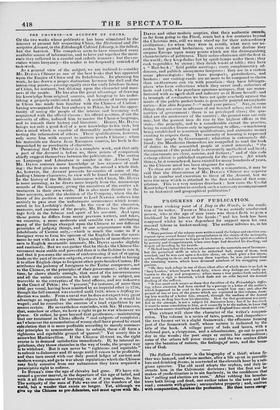PROGRESS OF PUBLICATION.
THE most striking point of A Day in the IP-oods, is the condi- tion of its writer. THOMAS MILLER "iS an entirely uneducated
person, who at the age of nine years was thrust forth to gain a livelihood by the labour of his bands:" and his book has been composed whilst he was dependent for support upon his own manual labour in basket-making. The author informs us, in his Preface, that
" Many portions of the volume were written amid the fatigue and exertion con- sequent upon several hours daily perambulation in the streets of the metropolis,
in unsuccessful endeavours to dispose of his baskets ; when his spirit was subdued by 1)0V el ty and disappointment, when even hope had deserted his dwelling, and desplir sat brooding by his hearth.
" Ile had long before this been an adventurer on the uncertain sea of literature; but the pet iodical skiffs in whit h he embarked had, many of them, been wrecked, and he was cast upon a desolate shore, on which grew a few oziers; and by clinging to these, and weaving them together, he was just saved from the returning waves, which have devoured numbers of his struggling com- panions. "He then took refuge in one of those silent allies of which there is no lack in busy London,' where hearts break daily, whose deep feelings are wholly un- known to the gay and prosperous; where many a tear gushes forth unheeded, and many a sigh is breathed, which finds not an echo beyond the desolate dwelling of the sufferer. " It was amid such scenes as these that the editor of the Friendship's Offer- ing, whose attention had been excited by a passage in a letter of the author's, which happened to be read in his presence, sought him out; and, after the perusal of one or two of the poems which are reprinted in this volume, deem- ing him worthy of a better fate, essayed, through the medium of the Annual alluded to, to drag him from his obscurity. How far that gentleman was justi- fied in the attempt, is not a subject for discussion lucre ; but if he has erred, it must be some consolation to him, as it assuredly is to the author, to know that many whose names stand high in the literature of England have erred with him."
This extract will show the character of the writer's composi- salon. The volume is a series of tales, poems, and rhapsodies— the two former set in a slight framework; the effusions forming part of the framework itself, whose nature is indicated by the title of the book. A village party of lads and lasses, with a widowed poet, a clergyman, and a schoolmaster, go out to pass a day in the woods; the poet sings or recites his compositions; some of the others tell prose stories; and the two seniors dilate upon the beauties of nature, the feelingsaof man, and the boun- ties of God.


























 Previous page
Previous page